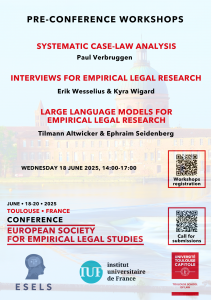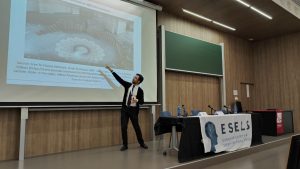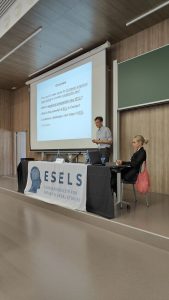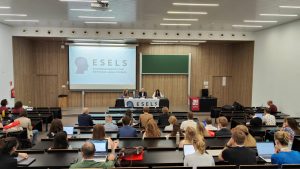18 June 2025
Workshops on Empirical Legal Research
ESELS Working Group
Computational Legal Methods
Description
The topic of the working group focuses on the use of computational methods, the application of data-driven techniques, to study law, legal material, or questions related to the law. This includes a great range of quickly evolving techniques, including e.g. machine learning (ML) and natural language processing (NLP), for a variety of tasks. The overall topic of the working group is how computational methods can be developed and applied to the legal domain. This includes a number of discrete sub- topics, including
(i) the improvement of data-driven techniques generally but also the adaptation of such techniques to the specific conditions of the legal domain (method development);
(ii) the application of such techniques to answer specific research questions; and
(iii) the theoretical and conceptual advancements related to the use of computational methods in the legal domain.
Aims and objectives
The main objective of the working group is to further the advancement and use of computational methods in law in order to conduct accurate research, to tackle novel research questions, and to achieve novel insights.
Strategy
The field of computational methods in law is rapidly growing, though it is still in its early stages, particularly in Europe. This working group aims to provide a forum to bring together and support the development of this emerging discipline. While a small group of legal scholars already identify as computational legal scholars—many of whom are founding members—there is also increasing interest from younger academics.
In addition to those specializing in empirical legal studies, the working group also seeks to attract scholars in legal informatics and computer scientists who focus on law and legal data. From this we hope to grow the community and learn from each other and to support young academics seeking to enter this field.
Chairs
Tilmann Altwicker
Johan Lindholm
Group Members
Corinna Coupette
Arthur Deyvre
Yoan Hermstrüwer
Ryohei Hisano
Elena Kantorowicz-Reznichenko
Michael Livermore
Måns Magnusson
Felix Steffek
Gijs van Dijck
Sean Fobbe
Nabeela Siddiqui
Anouk Lamé
Julien Betaille
Moritz Tilgner
Mikołaj Ryśkiewicz
Tabea Krauss
Sofia Santinello
Daniel Naurin
Federica Casano
Stephan Tontrup
Eirini Tsoumani
Ryan Drummond
Contact
johan.lindholm@umu.se
More info on starting an ESELS Working Group can be found here.
Stay up to date about ESELS
ESELS Newsletter September 2024
Welcome to the ESELS newsletter of September 2024!
In this second edition, we take a look back at our very successful ESELS 2024 Annual Conference in Elche.
We also look forward to our upcoming Annual Conferences at the University of Toulouse (France) in 2025 and the University of Ljubljana (Slovenia) in 2026. (Keep an eye out for our call for abstracts in early 2025!)
We are also happy to share the results of the 2024 elections that took place during the Annual Conference in Elche. Moreover, the Board has launched a call for proposals by ESELS members for ESELS working groups.
Finally, Gaspar Dugac and Tilmann Altwicker (University of Zürich) shed light on the phenomenon of Large Language Models and potential role for empirical legal studies.
Happy reading!
ESELS Newsletter September 2024
Annual Conference 2024
ESELS Conference Report Elche 2024
On 20-21 June 2024 the highly successful Annual Conference of ESELS took place in the city of Elche (Spain), hosted by the Universidad Miguel Hernández. For two days more than 120 scholars working in the field of Empirical Legal Studies from all over Europe and around the world convened and contributed to fruitful intellectual exchanges and collaboration on empirical-legal research and teaching.
Day 1
After a wonderful, historical address by the major of Elche on Wednesday the 19th, the Conference officially started off on Thursday the 20th with a warm welcome by ESELS President Catrien Bijleveld and opening by vice-rector Vicente Micol Molina.
In the first plenary address, keynote speaker Juan S. Mora-Sanguinetti shared his expertise on regulatory complexity and the impacts of anti-discrimination legislation and “green regulation”, followed by an engaging discussion with the audience.
From the end of the morning onwards interactive panel sessions on Empirical Legal Research took place, in which scholars from different legal backgrounds and disciplines showcased their researching findings and engaged in productive discussions with their ELS colleagues.
In the afternoon, after a delicious lunch, the ESELS General Assembly convened. The attending ESELS members elected Tilmann Altwicker as ESELS Future President (2025/26) and Rita Gsenger as ESELS Board Member.
Also, during the GA Jessie Pool was thanked for all her efforts for the Society before stepping down as past President. Finally, Julien Bétaille delivered a compelling presentation on the next ESELS Conference in the wonderful city of Toulouse, on 19-20 June 2025.
At the end of the afternoon the ice cream event with poster presentations offered more networking opportunities. The first day concluded with a social gathering with drinks at the pool of the beautiful, palm-surrounded Hotel Huerto del Cura, followed by a wonderful dinner featuring many delicious Spanish specialties.
Day 2
The second day of the conference commenced with another set of engaging ELS panel sessions, providing participants with more opportunities to explore interdisciplinary topics of interest, on criminal law, compliance, constitutional studies and European courts.
During the plenary session at the end of the morning, moderated by ESELS President Urška Šadl, two intriguing keynotes were delivered. Barbora Holá captured the attention of the audience with a compelling address on “Doing Justice after Atrocities”, followed by an insightful discussion by Mathias Siems on the most recent developments in the growing field of Comparative Empirical Studies in Europe.
After the keynotes attendees enjoyed another networking lunch, further strengthening the connections formed during the conference. The afternoon featured two additional rounds of stimulating panel sessions, offering participants the chance to delve into a diverse range of subjects and engage in fruitful dialogues, for example during the Presidential Panel on the meaning and importance of ELS for legal scholars and students.
The closing ceremony was chaired by past President Catrien Bijleveld, delivering thankful words to the outstanding local organization for making this great event possible. On behalf of the local organization Fernando Miró Llinares handed over the ESELS flag to Executive Secretary Erik Wesselius, to be displayed again during the next Annual Conference in Toulouse on 19-20 June 2025 at the Université Toulouse Capitole.
The Future of the Law
ESELS Conference 2025 Toulouse
ESELS Conference book (last update) – Toulouse 2025
The upcoming Annual ESELS Conference will take place on 19-20 June 2025 in Toulouse, France. The event will be hosted by the Université Toulouse Capitole: one of the oldest universities in Europe (founded in 1229) and widely known for its long-standing commitment to Empirical Legal Studies. This makes Toulouse an excellent venue to showcase the importance of empirical thinking in both the history and the future of the law.
The ESELS 2025 Conference will offer legal scholars from across Europe and beyond the opportunity to present their empirical research to a European audience of scholars. We welcome pre-arranged panels, full papers and single abstracts with relevance for European lawyers, employing quantitative and/or qualitative methods of various kinds.
Moreover, key note speakers of great renown will shed their light on the relevance of empirical-legal research in Europe today and in the future, while historians of legal thought take you to the origins of Empirical Legal Research in Europe.
For junior ELS scholars and PhDs our upcoming Annual Conference provides a unique opportunity to share their work-in-progress and receive valuable feedback from European legal scholars and colleagues. We also invite early-career researchers to submit full papers and become nominated for our ESELS young scholar recognition.
Our call for submissions is open from 15 December 2024 to 15 February 2025. In this period registration is also possible for our two pre-conference training workshops, taking place on 18 June 2025 in the afternoon at the Université Capitole (more info follows). The Annual Conference officially opens on the evening of 18 June at the city hall with a historical address about the Université Capitole.
Toulouse
The city of Toulouse has an impressive historical heritage, a unique natural environment and a rich culture. It is often a fascinating destination for visitors! The city is lively with a vibrant student life and comfortable climate. Some of its highlights are the historical Place du Capitole, the Chapel, the idyllic Garonne river, the Jardin des Plantes and the medieval Cathédrale Saint-Étienne de Toulouse.
Accommodations Toulouse
Below, we leave you a list of hotels located in the centre of the city of Toulouse, close to the Toulouse Capitole University :
– Premium hotels
**** SOCLO (≈ 310 euros/night ; 5 min walk from the conference) : https://www.soclo.fr/en/
**** Villa du Taur (≈ 180 euros/night ; 10 min walk from the conference) : https://www.villadutaur.com/fr/
**** Hotel de Brienne (≈ 140 euros/night ; 10 min walk from the conference) : https://www.hoteldebrienne.com/en/
– Middle range hotels
*** Appart’hotel Odalys Compans Caffarelli (≈ 75 euros/night ; 15 min walk from the conference) : https://www.odalys-vacances.com/location-ville/sud-ouest/toulouse/centre-compans-caffarelli.html
*** Hotel Une chambre en Ville (≈ 100 euros/night ; 15 min walk from the conference) : https://toulouse.unechambreenville.fr/ ** Hotel Gascogne (≈ 80 euros/night ; 20 min walk from the conference) : https://www.hotel-gascogne.com/fr/
** Résidence hotel Le Pastel François Verdier (≈ 70 euros/night ; 30 min walk from the conference or 20 min by public transportation) : https://hotel-lepastel-toulouse.com/fra/room_categories
** Hotel Arnaud-Bernard (≈ 60 euros/night ; 5 min walk from the conference) : https://www.hotel-arnaudbernard.com/
– Hostel
La petite auberge de Saint Sernin (≈ 30 euros/night ; 5 min walk) : https://lapetiteaubergedesaintsernin.com/en/hostel-toulouse/ Hostel Toulouse Wilson (≈ 30 euros/night ; 20 min walk): https://hostel-toulouse-wilson.com/en/
Eklo Toulouse (≈ 35 euros/night ; 30 min by public transport from the conference) : https://www.eklohotels.com/fr/toulouse
Conference prices Toulouse 2025 (ticket conference dinner not included)
ESELS Members
Early bird & PhD student: 75 euros
Early bird: 100 euros
Regular: 200 euros
Non-members
Early bird & PhD student: 175 euros
Early bird: 225 euros
Regular: 325 euros
Vacancy
Post-doctoral position in Empirical Legal Studies
We seek a candidate with an excellent research background to join our Department of Economics and Empirical Legal Studies team. The department is fully integrated into the international ELS community, with members playing a pivotal role in establishing the European Society for Empirical Legal Studies and the European Journal of Empirical Legal Studies. We aim to develop our legal research team further.
The successful candidate is expected to bring in and develop their own, internationally competitive, research agenda and collaborate with department members on their suitable existing research projects, such as field experiments on discrimination, laboratory experiments on human-machine transactions and contract design, disparities in judicial decision-making, penal policy, and other policy-relevant topics.
Candidates should possess a PhD or JSD with solid training in research methods (economics, law, or related social science). A law degree or substantial legal training would be an advantage.
Workplace: Department of Economics and Empirical Legal Studies
Supervisor: doc. Ing. Josef Montag, Ph.D.
E-mail of the supervisor: montagj@prf.cuni.cz
Details about this and other Post-Doctoral jobs at our faculty and how to apply are here https://lnkd.in/dZz_kpfH.
Stay informed about ESELS
First edition ESELS Newsletter 2024
Welcome to the ESELS bi-annual newsletter
As of 2024, the European Society for Empirical Legal Studies publishes its
newsletter twice a year. The aim is to inform ESELS members about the
Society’s activities and conferences as well as highlight the work of ESELS
members.
In this first edition, we introduce a new candidate for at-large board member
and a candidate for ESELS President. We also highlight the launch of the
European Journal for Empirical Legal Studies and look forward to the ESELS 2024 Annual
Conference in Elche.
Finally, Julien Bétaille (Associate Professor, Toulouse
Capitole University Law School and Member of the Institut universitaire de
France) sheds a light on the critical role of empirical research in
environmental law.
Happy reading!








